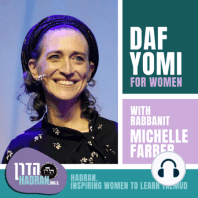47 min listen
Eruvin 73 - October 21, 3 Cheshvan
ratings:
Length:
47 minutes
Released:
Oct 21, 2020
Format:
Podcast episode
Description
Pictures Study Guide Eruvin 73 Today's daf is sponsored by Arlene Sevrinsky in memory of her father, Mordechai ben Avraham z"l on his yahrzeit. He taught us to love family, torah, learning and music. May his neshama have an aliyah. And by Hannah and Michael Piotrkowski in memory of Hannah's mother, Tsina Tova bat Leib Yisroel z"l on her 50th yahrzeit. She valued humility above all and is more loved and remembered as the years pass. What is the determining factor regarding eruv - where one sleeps or where one eats? If a man has a number of wives who each live in their own house, are they considered one unit for eruv or separate units? What about slaves? A student at his rabbi's house if he sleeps and eats there? Can one view a father and children or a rabbi and student as one unit for certain laws of eruvin and as separate units for others (in order to be lenient)? The mishna brings a number of cases regarding courtyards that open to each other and also to a shared alley. If they did only eruv of the courtyards or only shituf mevo'ot (sharing of alleyways), would it cover the other? What if there were both but one person/courtyard didn't join the eruv/shituf? The gemara struggles to understand the mishna as it seems to side on different sides of the Rabbi Meir/Rabbis debate regarding can one suffice with only one of the two. In the end, they conclude the mishna is all rabbi Meir and they explain the cases to match his opinion. Rav has an alternate version of the mishna - that the courtyards do not open to each other. Why does he not agree with the other version? Today's daf is sponsored by Arlene Sevrinsky in memory of her father, Mordechai ben Avraham z"l on his yahrzeit. He taught us to love family, torah, learning and music. May his neshama have an aliyah. And by Hannah and Michael Piotrkowski in memory of Hannah's mother, Tsina Tova bat Leib Yisroel z"l on her 50th yahrzeit. She valued humility above all and is more loved and remembered as the years pass. What is the determining factor regarding eruv - where one sleeps or where one eats? If a man has a number of wives who each live in their own house, are they considered one unit for eruv or separate units? What about slaves? A student at his rabbi's house if he sleeps and eats there? Can one view a father and children or a rabbi and student as one unit for certain laws of eruvin and as separate units for others (in order to be lenient)? The mishna brings a number of cases regarding courtyards that open to each other and also to a shared alley. If they did only eruv of the courtyards or only shituf mevo'ot (sharing of alleyways), would it cover the other? What if there were both but one person/courtyard didn't join the eruv/shituf? The gemara struggles to understand the mishna as it seems to side on different sides of the Rabbi Meir/Rabbis debate regarding can one suffice with only one of the two. In the end, they conclude the mishna is all rabbi Meir and they explain the cases to match his opinion. Rav has an alternate version of the mishna - that the courtyards do not open to each other. Why does he not agree with the other version?
Released:
Oct 21, 2020
Format:
Podcast episode
Titles in the series (100)
Berakhot 12: It was implied from something Rabbi Zeira said that the blessing the priests said in the temple before shema was "God who created light." But the gemara rejects this and says that one can interpret that statement in a different way and it could be the... by Daf Yomi for Women - Hadran
